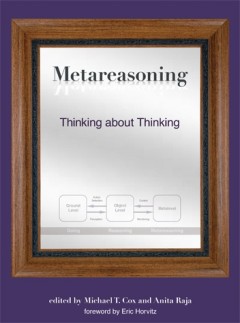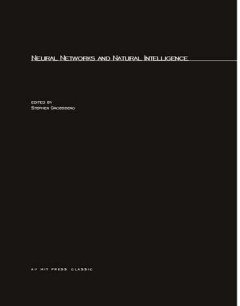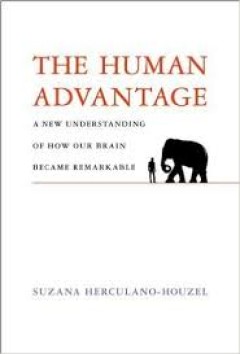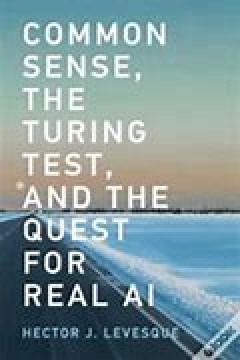Filter by

Metareasoning: Thinking about Thinking
This text offers a simple model of reasoning about reason as a framework for its discussions. Following this framework, the contributors consider meta-level control of computational activities, introspective monitoring, distributed meta-reasoning, and, putting all these aspects of meta- reasoning together.OCLC-licensed vendor bibliographic record.
- Edition
- -
- ISBN/ISSN
- 9780262295284
- Collation
- 1 online resource (vi, 340 pages) :illustrations
- Series Title
- -
- Call Number
- -

Neural networks and natural intelligence
"A Bradford book."Stephen Grossberg and his colleagues at Boston University's Center for Adaptive Systems are producing some of the most exciting research in the neural network approach to making computers "think." Packed with real-time computer simulations and rigorous demonstrations of these phenomena, this book includes results on vision, speech, cognitive information processing; adaptive pa…
- Edition
- -
- ISBN/ISSN
- 9780262315937
- Collation
- 1 online resource (xi, 637 pages) :illustrations
- Series Title
- -
- Call Number
- -

The Human Advantage: A New Understanding of How Our Brain Became Remarkable
"Humans are awesome. Our brains are gigantic, seven times larger than they should be for the size of our bodies. The human brain uses 25% of all the energy the body requires each day. And it became enormous in a very short amount of time in evolution, allowing us to leave our cousins, the great apes, behind. So the human brain is special, right? Wrong, according to Suzana Herculano-Houzel. Huma…
- Edition
- -
- ISBN/ISSN
- 9780262333214
- Collation
- 1 online resource :illustrations
- Series Title
- -
- Call Number
- -

Common Sense, the Turing Test, and the Quest for Real AI
"What can artificial intelligence teach us about the mind? If AI's underlying concept is that thinking is a computational process, then how can computation illuminate thinking? It's a timely question. AI is all the rage, and the buzziest AI buzz surrounds adaptive machine learning: computer systems that learn intelligent behavior from massive amounts of data. This is what powers a driverless ca…
- Edition
- -
- ISBN/ISSN
- 9780262338363
- Collation
- 1 online resource (xv, 172 pages) :illustrations
- Series Title
- -
- Call Number
- -

The creative brain :myths and truths
"A nuanced, science-based understanding of the creative mind, one that punctures many (but not all) of the standard myths that obscure this perennial topic"--OCLC-licensed vendor bibliographic record.
- Edition
- -
- ISBN/ISSN
- 9780262378550
- Collation
- 1 online resource
- Series Title
- -
- Call Number
- -

Bots and beasts :what makes machines, animals, and people smart?
"An honest attempt to compare and analyze the intelligence of humans, animals, and computers by an eminent cognitive scientist and long-time Press author"--OCLC-licensed vendor bibliographic record.
- Edition
- -
- ISBN/ISSN
- 0262365898
- Collation
- 1 online resource.
- Series Title
- -
- Call Number
- -

Playing smart :on games, intelligence and artificial intelligence
Can games measure intelligence? How will artificial intelligence inform games of the future? In 'Playing Smart', Julian Togelius explores the connections between games and intelligence to offer a new vision of future games and game design. Video games already depend on AI. We use games to test AI algorithms, challenge our thinking, and better understand both natural and artificial intelligence.…
- Edition
- -
- ISBN/ISSN
- 9780262350143
- Collation
- 1 online resource.
- Series Title
- -
- Call Number
- -

Mind readings :introductory selections on cognitive science
"A Bradford book."OCLC-licensed vendor bibliographic record.
- Edition
- -
- ISBN/ISSN
- 9780262315906
- Collation
- 1 online resource (xii, 344 pages) :illustrations
- Series Title
- -
- Call Number
- -

Mind in everyday life and cognitive science
"A Bradford book."AnnotationOCLC-licensed vendor bibliographic record.
- Edition
- -
- ISBN/ISSN
- 9780262267489
- Collation
- 1 online resource (viii, 529 pages) :illustrations
- Series Title
- -
- Call Number
- -
 Computer Science, Information & General Works
Computer Science, Information & General Works  Philosophy & Psychology
Philosophy & Psychology  Religion
Religion  Social Sciences
Social Sciences  Language
Language  Pure Science
Pure Science  Applied Sciences
Applied Sciences  Art & Recreation
Art & Recreation  Literature
Literature  History & Geography
History & Geography